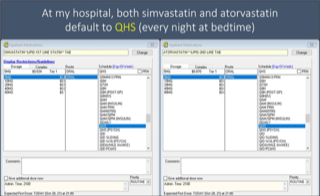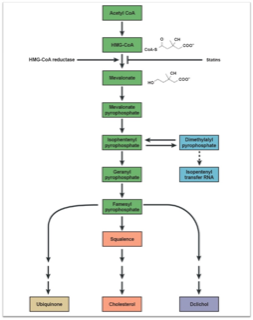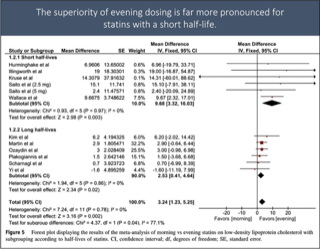Latest on Cardiac Care
- Home
- Latest on Cardiac Care
Why are statins administered at night?
In this tweetorial I'll discuss the mechanistic and historical reasons for the frequently used QHS dosing schedule. And why it's often unnecessary.
But before we get there, I'm curious: when do you prescribe/order/take statins?
Early studies suggested that evening administration of statins led to a greater reduction in cholesterol when compared with morning dosing.
Two notes on the linked study:
-
It is small
-
The differences in LDL reduction weren't as clear

As a result of this early data, the package insert for lovastatin, the first FDA-approved statin, suggested evening dosing.
And the landmark 4S trial did the same, administered simvastatin in the evening.


Any many hospitals, including my own, still default to evening dosing for statins.
Here are screenshots for simvastatin and atorvastatin.

To understand why evening dosing is often recommended, we must recall the mechanism of action of statins.
These medications work by inhibiting HMG CoA reductase, the rate-limiting enzyme in the cholesterol biosynthetic pathway.

Early data using mevalonate (a surrogate for cholesterol synthesis) suggested that...
-
HMG CoA reductase activity has a diurnal rhythm with peak activity between midnight and 6am.

More recent data using direct measures of cholesterol have found a similar spike after midnight.
This is likely due to a combination of both the circadian rhythms of enzyme activity and increased activity when fasting.

-
But the finding that evening administration leads to greater reductions in cholesterol doesn't seem to be a class effect.
For example, one study of atorvastatin dosing found a 47% reduction in LDL with BOTH morning and evening dosing.

So: simvastatin seems to work better when dosed in the evening while the timing of atorvastatin administration doesn't seem to matter.
What's different about atorvastatin, when compared with simvastatin, that explains this finding?
LONGER HALF LIFE
The most relevant difference is likely half-life. Notice the difference:
Simvastatin: 2-3 hours
Lovastatin: 2.9 hours
Atorvastatin: 15-20 hours

In meta-analyses, the difference between evening and morning dosing is significantly greater for statins with short half-lives.
For long-acting statins:
-
Total cholesterol is not affected by timing
-
LDL is minimally better with evening dosing

Going back to the original data, here's the reason evening dosing is superior for lovastatin and simvastatin:
-
These statins have short half-lives. By giving them at night, you ensure they work on their target enzyme (HMG CoA reductase) when its activity is highest.
Does it matter that many still default to evening dosing of ALL statins, despite little to no difference for long-acting versions?
Given that some data shows that adherence is higher for morning medications, it just might.

Before closing, I'm again curious: what will you do now?
Will do prescribe/order/take only in the morning (to increase adherence), evening (maybe it's better), modify based on the statin half-life, or ask the patient what you'd prefer?
IT DEPEND ON STATINS
-
HMG CoA reductase activity is highest overnight
-
Based on this, statins with short half-lives may be more effective when taken at night
-
For statins with longer half-lives, timing likely does not matter

